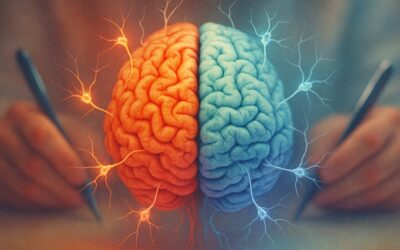Every story has a beginning. In this case, it starts in the outer realms of our perception where the senses collect raw data about the world around us, a constant influx of information from touch, sight, sound, smell, and taste. Each piece of sensory data sets off a unique pattern of electrical activity, pulsing through billions of nerve cells in the brain, known as neurons.
Imagine, if you will, the brain as an intricate cityscape. The neurons are the buildings, and they communicate with each other through connections called synapses, the city’s bustling streets and alleyways. Each neuron can have thousands of these synapses, and it’s the changing strength of these synaptic connections that allows us to learn and form memories.
Let’s now think of a memory as a story. A story that begins with an experience. As you walk through a pine forest, the prickly feeling of the needles underfoot, the smell of the pines, the sound of a bird singing high above – these sensory details are whisked along various pathways to different parts of the brain, where they are processed and integrated into a single cohesive experience.
The sensory data first passes through the thalamus, the brain’s central hub for information relay. From there, it’s sent to the appropriate processing areas, such as the visual cortex for sight, auditory cortex for sound, and so forth. It’s the hippocampus, a seahorse-shaped structure, that then weaves these individual threads into a unified tapestry. It does this by prompting the neurons involved in the experience to strengthen their connections, thereby reinforcing the neural circuit that corresponds to this memory.
Imagine the hippocampus as a grand orchestrator, meticulously conducting the symphony of neurons. Each beat, each note, strengthens the connections between the neurons, allowing the melody of memory to echo stronger and clearer. This strengthening process is known as long-term potentiation, and it’s the essence of how our brain forms lasting memories.
But the story doesn’t end here. After the initial memory formation in the hippocampus, a process of memory consolidation begins. This process transfers the newly minted memories to the cortex, the outer layer of the brain responsible for higher thought processes. Here, they are stored for the long term. This consolidation can take anywhere from days to years, and it’s believed that the act of recalling a memory accelerates this transfer.
However, it’s not just about storing memories, but retrieving them too. When you remember something, the neural pathway formed when the memory was encoded is reactivated. These paths become well-trodden roads in the vast landscape of your brain, and the more frequently you recall a memory, the more these paths are reinforced, ensuring the memory remains clear and vivid.
A curious side note to our memory narrative is the role of sleep. Have you ever wondered why sleep deprivation affects memory? During the non-REM stages of sleep, our brain waves slow down, allowing the hippocampus to replay the day’s events, thereby strengthening the memory traces and assisting in their transfer to the cortex. Hence, a good night’s sleep is not merely restful; it’s essential for solidifying our memories.
This spectacularly complex process is a testament to the brain’s astonishing capabilities. The brain doesn’t just store memories in isolated boxes. Instead, each memory is a dynamic, interconnected web of neurons spread across the brain, each one contributing a piece to the vibrant tapestry of our experiences, shaping our understanding of the world and our identity within it.
While the narrative of memory formation is woven with scientific fact, it is colored with the artistry of our human experience. It’s a tale not merely of neurons and synapses but of who we are, how we learn, and how we remember. As we continue to unravel the mysteries of the brain, we move closer to understanding the beauty and complexity of our shared human story. The memory is not just a scientific curiosity; it is an integral part of our existence, a timeless tale of perception, experience, learning, and growth.
Every tale has an ending. But in this case, the end is just the beginning. As we understand more about how the brain stores memories, we open up new possibilities for enhancing learning, treating memory-related disorders, and perhaps even uncovering the secrets of consciousness itself. And that, dear reader, is a story for another day.










0 Comments